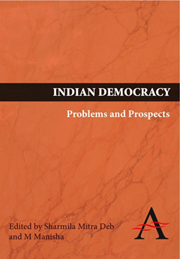Book contents
- Frontmatter
- Contents
- List of Contributors
- PREFACE
- Introduction DEMOCRATIC POLITICS IN INDIA: CONCEPTS, CHALLENGES AND DEBATES
- 1 RECONSTRUCTING DEMOCRATIC CONCERNS IN INDIA
- 2 ARE WE READY FOR DEMOCRACY? A FEW OBSERVATIONS
- 3 DEMOCRACY AND POVERTY IN INDIA
- 4 DEMOCRACY AND FEDERALISM IN INDIA: TWO EPISODES AND A SET OF QUESTIONS
- 5 INDIA'S COALITION FUTURE?
- 6 HOW DEMOCRATIC IS OUR PARLIAMENT? ELITE REPRESENTATION AND FUNCTIONAL EFFICIENCY OF LOK SABHA
- 7 DEMOCRACY'S JANUS FACE: A REVIEW OF ELECTIONS IN POST-INDEPENDENCE INDIA
- 8 THE NATURE OF THE OPPOSITION IN INDIA'S PARLIAMENTARY DEMOCRACY
- 9 RESTYLING DEMOCRACY? MAINSTREAM MEDIA AND PUBLIC SPACE VIS-À-VIS INDIAN TELEVISION
- 10 THE POOR WORKING WOMEN: THE ACHILLES HEEL OF INDIAN DEMOCRACY – A PROFILE OF THE MAIDSERVANT FROM THE BUSTEES OF KOLKATA
- 11 HOW IS DEMOCRACY IN SOUTH ASIA? A COMPARISON OF THE ELITE AND THE MASS ATTITUDES
3 - DEMOCRACY AND POVERTY IN INDIA
Published online by Cambridge University Press: 05 March 2012
- Frontmatter
- Contents
- List of Contributors
- PREFACE
- Introduction DEMOCRATIC POLITICS IN INDIA: CONCEPTS, CHALLENGES AND DEBATES
- 1 RECONSTRUCTING DEMOCRATIC CONCERNS IN INDIA
- 2 ARE WE READY FOR DEMOCRACY? A FEW OBSERVATIONS
- 3 DEMOCRACY AND POVERTY IN INDIA
- 4 DEMOCRACY AND FEDERALISM IN INDIA: TWO EPISODES AND A SET OF QUESTIONS
- 5 INDIA'S COALITION FUTURE?
- 6 HOW DEMOCRATIC IS OUR PARLIAMENT? ELITE REPRESENTATION AND FUNCTIONAL EFFICIENCY OF LOK SABHA
- 7 DEMOCRACY'S JANUS FACE: A REVIEW OF ELECTIONS IN POST-INDEPENDENCE INDIA
- 8 THE NATURE OF THE OPPOSITION IN INDIA'S PARLIAMENTARY DEMOCRACY
- 9 RESTYLING DEMOCRACY? MAINSTREAM MEDIA AND PUBLIC SPACE VIS-À-VIS INDIAN TELEVISION
- 10 THE POOR WORKING WOMEN: THE ACHILLES HEEL OF INDIAN DEMOCRACY – A PROFILE OF THE MAIDSERVANT FROM THE BUSTEES OF KOLKATA
- 11 HOW IS DEMOCRACY IN SOUTH ASIA? A COMPARISON OF THE ELITE AND THE MASS ATTITUDES
Summary
The present paper is an attempt to discuss the paradox that is critical to making sense of ‘democratic India’ or democracy in India and lies at the heart of the radical democratic enterprise in the country. Simply stated, the paradox of Indian democracy lies is the continued coexistence of democracy and poverty in India since independence. Or to state it more carefully, the paradox involves the continued existence of electoral democracy with mass participation, along with mass poverty. This chapter attempts to develop an explanatory framework that gives us a sense of the mechanism that makes this paradox possible and allows us to understand the changes over time and differences across the various states in the relationship of democracy with poverty.
The paper includes two parts. In the first part, it specifies the meaning of the two crucial terms – democracy and poverty, and defends the claim that their coexistence is indeed a paradox, that there is something to be surprised about their being together. It sketches a simple model of why we should expect electoral democracy with mass participation to expend its principal energy and resources in reducing mass poverty. It then goes on to suggest that in the case of India, the paradox is deeper than what is thought of, for some of the most common reasons for which democracies do not attend to poverty do not apply in the case of India.
- Type
- Chapter
- Information
- Indian DemocracyProblems and Prospects, pp. 26 - 38Publisher: Anthem PressPrint publication year: 2009



